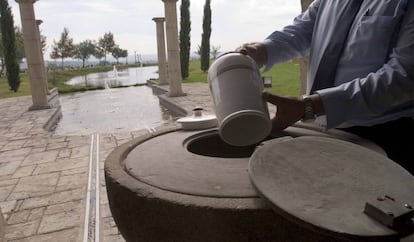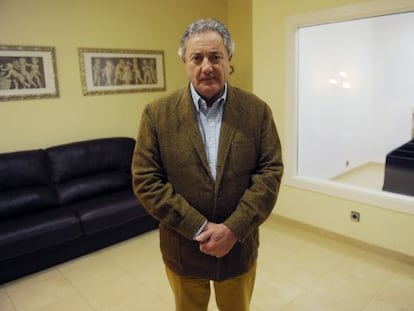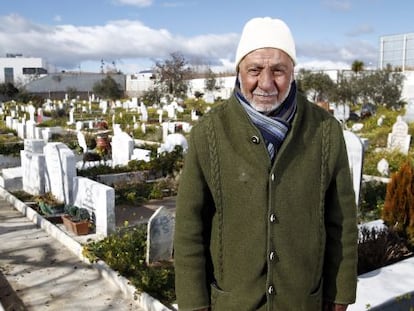Spain turns back on burials as cremations gain ground
Incineration is an increasingly popular option but the pope¡¯s ban on scattering ashes raises issues

The Singul family could have chosen a standard funeral but their father wanted to be cremated. They are not alone in that choice. A decade ago, just 16% of funeral services in Spain involved cremation, but that number is now 36%, with some 152,000 cremations carried out last year of a total of around 442,000 deaths in the country, according to the national association of funeral services Panasef.

The association expects this number will continue to rise and is predicting six out of every 10 funerals in Spain will be cremations in 2026. That figure is already 70% in bigger cities while some €800 million has been spent on cremation furnaces in the last decade.
¡°Young people don¡¯t like visiting cemeteries,¡± says Panasef spokesperson Reyes Aguilar, explaining the change in tradition. Cost is not at stake either: people are paying an average of €3,600 for both funerals and cremations.
FC Barcelona is looking at making space for 20,000 urns at its Camp Nou stadium
¡°There is no economic difference at the outset, although in the long run burials can be more expensive when you have to renew the lease on a grave,¡± a spokesperson from the San Jos¨¦ cemetery in Granada.
But there is a potential problem with cremation. What should be done with ashes?
For the Singuls, it was straightforward. They used the services of Barcelona company Gala Azul, which offers ash-scattering services. ¡°It was what he would have wanted ¨C in his Mediterranean,¡± said the deceased man¡¯s son.
For Catholic families, however, the situation is more difficult given the Church¡¯s recent decision to ban the scattering of ashes and to forbid them being kept at home.
Spain has no national law regulating funeral services ¨C something Panasef would like to see change as soon as possible ¨C and every municipality has its own rules. This situation led to most cemeteries making provision for the placement of urns or the scattering of ashes.
People who illegally scatter ashes in Roc¨ªo in southern Spain face fines of up to €15,000
Some graveyards go a step further. The Roques Blanques cemetery in Barcelona is located within a natural reserve and administrators are currently creating a kilometer-long mountain trail where people will be able to stage green burials of biodegradable funeral urns. The site already has 2,000 environmentally friendly graves for ashes and will be the first in Spain to have an area of this size dedicated to the burial of ashes.
Other cemeteries are offering such spaces for free. Zaragoza¡¯s Torrero cemetery is home to a garden where people can scatter ashes at no cost, while another section of the cemetery is given over to the burial of biodegradable urns ¨C for a fee.
Elsewhere in Spain, local authorities have had to impose strict rules to stop the scattering of ashes. One of these places is the pilgrimage site of Roc¨ªo in southern Spain¡¯s Huelva province, where pilgrims had developed the practice of scattering ashes in the village. Anyone now wishing to place urns in the municipality¡¯s cemetery must apply for permission or face a fine of up to €15,000.
A statue dedicated to the legendary bullfighter Curro Romero, which stands outside Seville¡¯s Maestranza bullring, is another popular location for the scattering of ashes. The Andalusian capital doesn¡¯t have specific by-laws relating to ashes but these are covered by rules regarding littering.

Then there are those soccer stadiums where fans hope to spend the rest of their days. At present, three club grounds ¨C Benito Villamar¨ªn (Real Betis), Vicente Calder¨®n (Atl¨¦tico de Madrid) and Cornell¨¤-El Prat (RCD Espanyol) ¨C have columbaria where urns can be placed.
For FC Barcelona fans, all hope is not lost. The club has said it is looking at the creation of its own columbarium with space for 20,000 urns ¨C a project it hopes can raise €6 million.
English version by George Mills.
Tu suscripci¨®n se est¨¢ usando en otro dispositivo
?Quieres a?adir otro usuario a tu suscripci¨®n?
Si contin¨²as leyendo en este dispositivo, no se podr¨¢ leer en el otro.
FlechaTu suscripci¨®n se est¨¢ usando en otro dispositivo y solo puedes acceder a EL PA?S desde un dispositivo a la vez.
Si quieres compartir tu cuenta, cambia tu suscripci¨®n a la modalidad Premium, as¨ª podr¨¢s a?adir otro usuario. Cada uno acceder¨¢ con su propia cuenta de email, lo que os permitir¨¢ personalizar vuestra experiencia en EL PA?S.
?Tienes una suscripci¨®n de empresa? Accede aqu¨ª para contratar m¨¢s cuentas.
En el caso de no saber qui¨¦n est¨¢ usando tu cuenta, te recomendamos cambiar tu contrase?a aqu¨ª.
Si decides continuar compartiendo tu cuenta, este mensaje se mostrar¨¢ en tu dispositivo y en el de la otra persona que est¨¢ usando tu cuenta de forma indefinida, afectando a tu experiencia de lectura. Puedes consultar aqu¨ª los t¨¦rminos y condiciones de la suscripci¨®n digital.










































